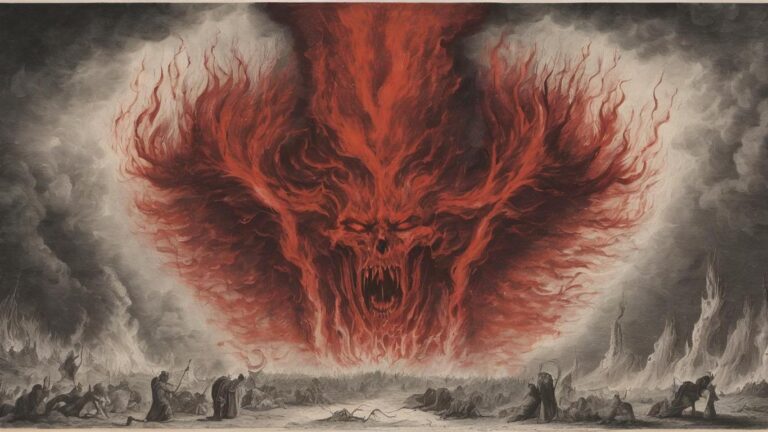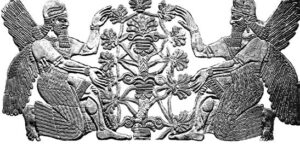Table of Contents
In Christianity, hell is often understood as a place of punishment for those who have committed sins and rejected God. The nature of hell varies among Christian denominations, and interpretations can range from a literal place of eternal torment to a more symbolic separation from God. Here are some key points regarding the Christian concept:
Eternal Punishment
In many Christian traditions, hell is considered a realm of eternal punishment. The idea is that those who have not accepted salvation through faith in Jesus Christ may face separation from God and endure suffering for eternity.
Fire and Torment. Biblical descriptions of hell commonly feature fiery imagery. The Book of Revelation mentions the “lake of fire” (Revelation 20:15), and Jesus uses Gehenna as a metaphor for judgment fires (Mark 9:43), symbolizing divine judgment severity and separation from God.
Outer Darkness. In the parables of Jesus, there are references to a place of “outer darkness” where there is weeping and gnashing of teeth (Matthew 8:12, 22:13, 25:30). This imagery suggests a state of isolation and sorrow.
Worm Does Not Die. In Mark 9:48, Jesus vividly describes hell as “where their worm does not die, and the fire is not quenched.” Many interpret this as portraying the enduring consequences of sin.
Eternal Separation from God. The fundamental punishment in many Christian interpretations is the separation from God. Hell is seen as a place where individuals are eternally cut off from the presence of God, and this separation is considered the ultimate source of suffering.
Judgment According to Deeds. The Bible often speaks of judgment based on individuals’ deeds. In Revelation 20:12, for example, it is written that the dead will be judged according to what they have done. This idea aligns with the concept of divine justice and the consequences of one’s actions.
Theological Perspectives

Different Christian denominations have varying theological perspectives on hell. Some emphasize the literal interpretation of hell as a place of conscious torment, while others may view it more symbolically as a state of spiritual separation from God.
Purpose of Hell
The purpose of hell in Christian theology is often seen as a consequence of human free will. Individuals who choose to reject God or commit grave sins may face the consequences of their actions in the afterlife.
Depictions in Scripture: The Bible, particularly the New Testament, contains various references to hell. Passages in the Gospels and other books describe it as a place of fire and outer darkness. The Book of Revelation, in particular, contains vivid imagery of judgment and the fate of the unrepentant.
Salvation and Avoidance of Hell. The Christian message often emphasizes the possibility of salvation through faith in Jesus Christ, repentance, and acceptance of God’s grace. The hope is that by following these teachings, individuals can avoid the punishment of hell and attain eternal life with God.
The concept of hell

Islam:
Hinduism: Hinduism encompasses a variety of beliefs; views on the afterlife and punishment can differ. In some Hindu traditions, there is a belief in reincarnation, and individuals may undergo suffering in various realms based on their actions (karma) in past lives. However, there isn’t a single, universally accepted concept of hell in Hinduism.
Buddhism: Buddhism generally does not have a concept of eternal hell. Instead, it emphasizes the cycle of birth, death, and rebirth (samsara) and the concept of karma. Negative actions can lead to rebirth in unfavorable conditions, but the goal is to attain enlightenment and escape the cycle of suffering.
Judaism: Views on the afterlife vary within different Jewish traditions. Some branches of Judaism do not have a strong emphasis on a specific concept of hell, while others may mention a place of punishment or purification.
FAQ
How is hell described in Christianity?
In Christianity, hell is often depicted as a place of eternal separation from God, with fiery imagery and various interpretations of punishment severity.
What is the Islamic perspective on hell?
In Islam, hell is known as "Jahannam," a place of punishment for those who reject Allah or commit grave sins. The severity of punishment is described in Islamic teachings.
Does Hinduism have a concept of hell?
Hinduism has diverse beliefs, and views on the afterlife vary. While some traditions mention suffering based on karma, there isn't a single, universally accepted concept of hell in Hinduism.
Are there alternative views on hell?
Yes, alternative views exist, including annihilationism, which suggests the possibility of non-existence rather than eternal conscious torment for those in hell.




